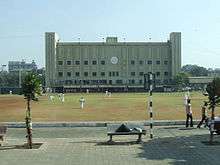Hindu Gymkhana, Mumbai
Parmananddas Jivandas Hindu Gymkhana, known as Hindu Gymkhana is a gymkhana (social and sporting club) located along Marine Drive in Mumbai.[1] It was originally started as Hindu Cricket Club in 1878.[2][3] The gymkhana itself was inaugurated by then Governor of Bombay, Lord Harris on 5 May 1894. At that time it was located on Marine Lines, which was the only access as Marine Drive was yet to be reclaimed.[3] Until 1942, membership of the gymkhana was restricted to people of Hindu religion. In 1942, when the government occupied the adjacent premises of the Islam Gymkhana and Parsi Gymkhana in Bombay during World War II, the gymkhana threw its membership open to Parsis and Muslims as well as an "emergency measure".[4] Hindu Gymkhana was responsible for fielding the Hindu XI in the Bombay Quadrangular and its successor Bombay Pentangular cricket tournaments.[5][6] The gymkhana is one of the founder members of the Bombay Cricket Association.[7] Hindu Gymkhana organises several tournaments such as Purshottam Shield Cricket Tournament, which is the oldest tournament started in 1912 that it organises.[8]

The Gymkhana has been identified as a Heritage Grade IIA structure.[9] As the gymkhana land belongs to the collector, one of its lease conditions is that the grounds should be accessible by the general public and non-sporting activities such as weddings are allowed to be held at the ground for up to 30 days in the year. In 2010, the local residents association moved court to ban non-sporting activities at the ground, since the general public was being denied access to it, something which the gymkhana denied.[10] In 2011, the collector restricted non-sport events to 25 days a year only on weekdays.[11]
Sachin Tendulkar gave his first television interview to Tom Alter at the Hindu Gymkhana grounds.[12] Indian Batsman Eknath Solkar was the son of a groundsman at Hindu Gymkana.[13]
References
- "Dandiya fun moves to suburbs". Daily News and Analysis. 4 October 2011. Retrieved 16 April 2012.
- Palsetia, Jesse S. (2001). The Parsis of India: Preservation of Identity in Bombay City. BRILL. p. 153. ISBN 9004121145.
- Maharashtra State Gazetteers: Greater Bombay District. (3 v.). Directorate of Govt. Print., Stationery and Publications, Maharashtra State. 1986. p. 386.
- "BOMBAY HINDU GYMKHANA: Membership thrown open to Non-Hindus". The Indian Express. 13 May 1942. Retrieved 16 April 2012.
- Majumdar, Boria (2006). Lost Histories of Indian Cricket: Battles Off the Pitch. Routledge. pp. 122. ISBN 0415358868.
- Aruṇa Ṭikekara, Aroon Tikekar (2006). The Cloister's Pale: A Biography of the University of Mumbai. Popular Prakashan. p. 74. ISBN 8179912930.
- "History of Gymkhana". Retrieved 16 April 2012.
- Fan Hong, J. A. Mangan (2003). Sport in Asian Society: Past and Present. Routledge. p. 186. ISBN 071465342X.
- "Dilip Kumar's Pali bungalow delisted". Daily News and Analysis. 29 May 2008. Retrieved 16 April 2012.
- "Marine Drive gyms face legal battle with locals". Times of India. 26 October 2010. Retrieved 16 April 2012.
- "Gymkhana weddings may be limited to 25 days a year, never on weekends". Daily News and Analysis. 21 December 2011. Retrieved 16 April 2012.
- "Tendulkar, entertainer par excellence". Times of India. 12 March 2011. Retrieved 16 April 2012.
- "Solkar passes away". The Telegraph. 27 June 2005. Retrieved 16 April 2012.